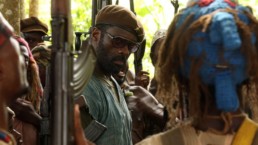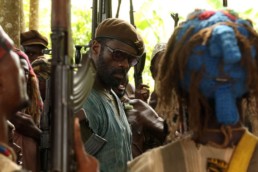‘Beasts of No Nation’ Review: Child Soldiers Show the Horrors of War
Idris Elba in his most commanding role yet.
Because we don’t see films in a vacuum, any story that carries social or political weight requires an extra step of scrutiny. This isn’t to dampen the experience, but to verify the authenticity of a cinematic experience. “Beasts of No Nation” is based on a novel carefully compiling numerous true accounts merged into the story of a child solider. An element worth dissecting is that this story does not take place in a specific location, instead opting for an unnamed African country. This has two potential effects. On the positive side, it makes the story and experience universal, as similar situations have happened in numerous central and western African countries. On the contrary, by not making the setting any one country in particular but a generic “Africa,” it continues an unfortunate American way of painting a massive continent with a single brush stroke. For as unique a story as this is, it only furthers the trend in viewing Africa as a country instead of a massive continent with numerous truths and stories within. This is a debate I don’t know the answer to, whether the universal nature of the story trumps its broad stroke of the continent.
What about the movie itself? The story structure in “Beasts” is that of “Pinocchio” or more recently, “12 Years a Slave” in terms of an innocuous individual getting swept into something horrific. In the beginning, our protagonist, Agu (Abraham Attah), is a boy living with a loving family. As civil war and unrest infiltrate their lives, it isn’t long before Agu is separated from his family and driven into a journey of the horrific world of warfare where children fight alongside adults as soldiers. After everything he’s been through, it isn’t hard for the rebel army to persuade him into actually wanting to be a solider (even though he doesn’t have another choice).
At the top of the army is the unnamed Commandant (Idris Elba). You’d expect this character to be a single stroke of evil, but he isn’t. He’s charismatic, he expresses interest and care in his soldiers, and he gives them a reason to fight. It’s even more terrifying that he is impressionable and even affable than if he were a terrorizing menace: in this world, he makes what they are doing seem okay, even though it is as nightmarish as you might anticipate.
In the middle of the film, we see this unsettling balance between the camaraderie and brotherhood of an army, in the backdrop of an absolutely sickeningly war. Much credit is given to the soundtrack, which is one of the best in recent memory. Because this is not a film with a plot or a driving story, but is more of a journey through the madness, it’s a film that evokes you to think about the story in a larger context. This also makes it arduous to endure through (and its runtime is well over 2 hours), but that is undoubtedly the intention. It is not a film for the light-hearted, nor would it ever be. Alas, although this story is fiction, this has been crafted to highlight the many facets of the child soldier journey.
Director Cary Fukunaga is also the cinematographer, therefore the camera work here is always on display. Numerous tracking shots expose the grandiose artistry at work and adds to the hypnotic nature of this warfare. The static shots are equally well composed. A provocative opening shot challenges the viewer to think about what they are watching, and how they are watching it. Is this entertainment? As affluent viewers (especially those on Netflix), how is this to be viewed? In this case, it is as important as the film itself to think about the social impact of this film. How can this film benefit a tragic, ongoing situation in a continent many Americans know little about is a question worth a further discussion. I don’t have the answer, but I urge anyone who sees this film to go into “Beasts of No Nation” looking for their answer to this question.
“Beasts of No Nation” opens at the Landmark this Friday.
H. Nelson Tracey
Nelson is a film director and editor from Denver based in Los Angeles. In addition to writing for Cinemacy, he has worked on multiple high profile documentaries and curates the YouTube channel "Hint of Film." You can check out more of his work at his website, hnelsontracey.com


